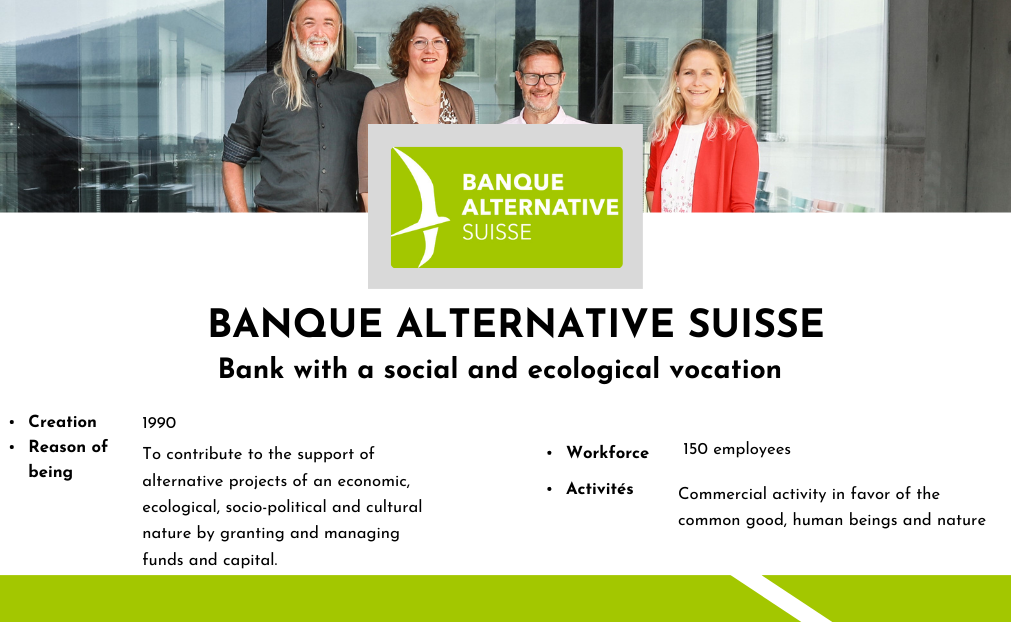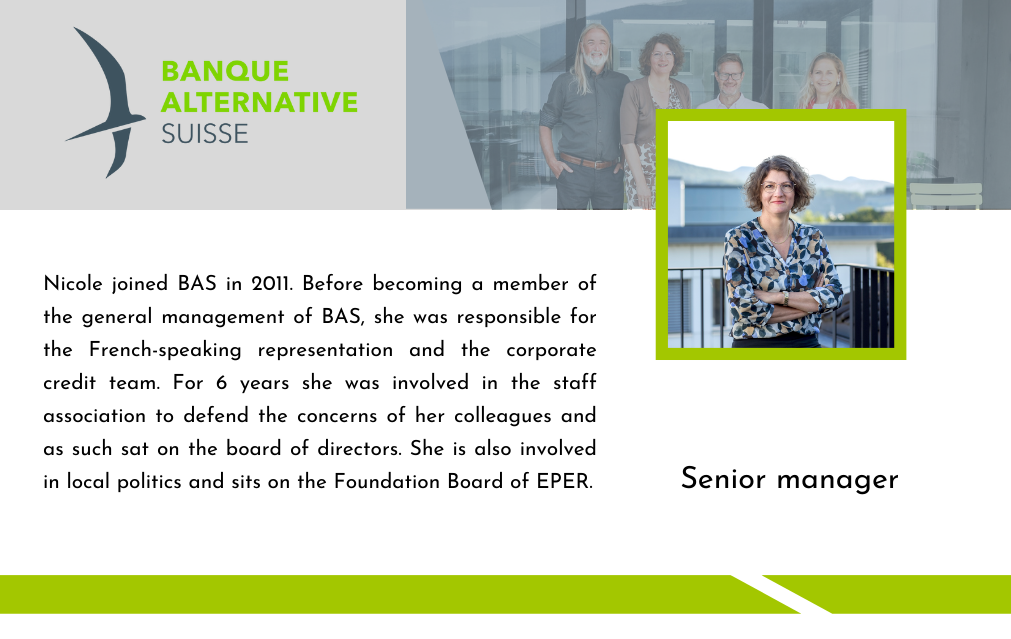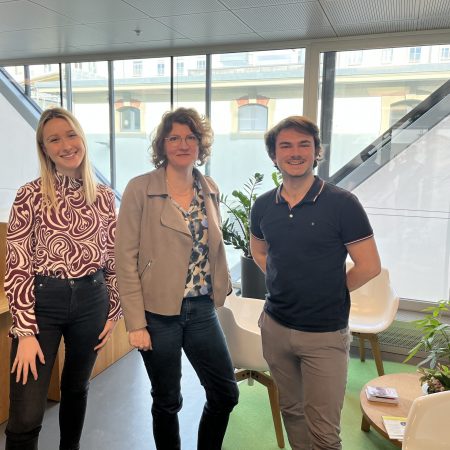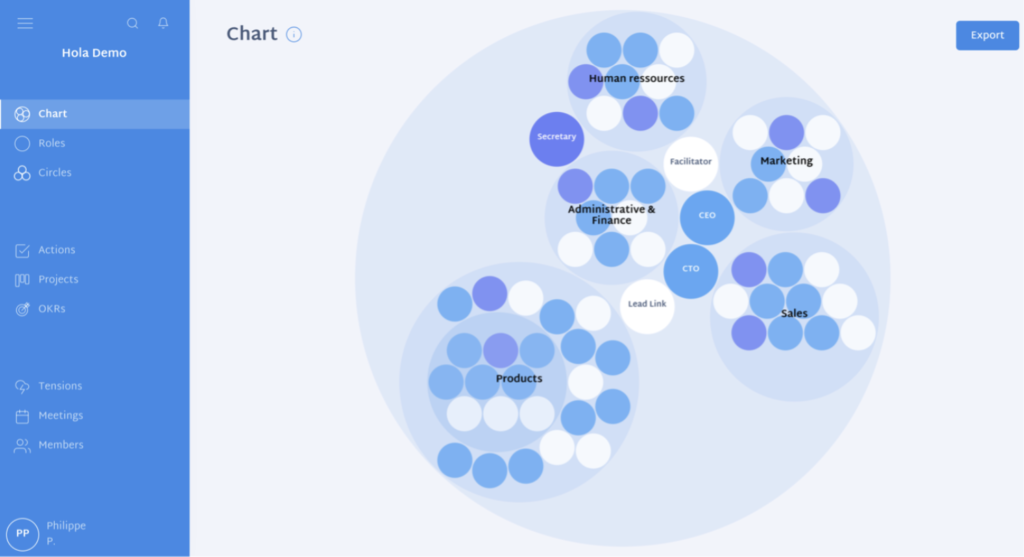
In this article, we will present the Alternative Bank of Switzerland in three steps: an explanation of its activities, what distinguishes the group at the managerial level, and a case study of how it reacted to an internal crisis (adoption of an agile management).



We visited the Alternative Swiss Bank (BAS) in Lausanne, which is different from the so-called “conventional” banks. It is indeed the only active bank with a social and environmental vocation in Switzerland.
Nicole Bardet, member of the general management, kindly accepted to receive us.
She explains that the BAS was founded in 1990, and that it is a bank which since its creation, within the framework of its commercial activities, is committed to the common good, to human beings and to the environment. Today it has about 150 employees and is supported by more than 8’700 shareholders. There are 4 locations, and the head office is in Olten. It is a bank with a total balance sheet of more than CHF 2.2 billion and more than 42,000 customers.
The BAS is a bank that renounces profit maximization and puts its ethical principles of action in the foreground. It invests its clients’ money in social and ecological projects and companies on a long-term basis. In fact it’s slogan is “truly different”.
The internal organization was very much built-in opposition to what the big banks were doing (no bonuses because other banks offer bonuses, transparency because other banks keep a lot of data confidential, rules are very much in favor of the staff…).

Since its inception, this bank has wanted to show that it is possible to think of banking differently. Here are some of the original principles and practices that have been put in place:
The BAS does not invest in countries that violate human rights, that wage wars, practice the death penalty or torture, that censor freedom of expression or that ignore climate protection. The BAS invests in projects that respect nature, people, and animals. In order to make the impact of the money known, all credits are published. The BAS also renounces any system of bonuses. Finally, the BAS wants to make a profit to strengthen its equity base and ensure its development, but it renounces profit maximization (the BAS does not speculate to maximize profits).
Employees can join the staff association (PA) and thus participate in all strategic decisions, as this association has a seat on the board of directors. The interesting thing is that the shareholders cannot refuse this seat (since it is normally the shareholders who elect the board members).In this case, Nicole has represented the staff on the board for 6 years.
But the staff association doesn’t just have a say on the board. There is also a committee elected by the staff that represents the association to the executive board.
In addition, the staff association has an important voice at the General Assembly. 400 shares are allocated to the association, making it an important voice.
The BAS has more than 8000 shareholders. But there is a clear rule: a shareholder cannot hold more than 5% of the capital (the BAS does not want to be “eaten” by one of its shareholders in order to preserve its ethics).
At the BAS, salaries are completely transparent. The salary is based on functions. Therefore, for the same respective function, the salary is equal. There are salary differences based on experience and age, but these are totally justified. There is no salary discrimination between men and women.
The difference between the lowest and highest salary is not more than 1:3,2. This means that if the lowest salary is 1000 francs, the highest salary is 3200 francs.
In 2018, the BAS experienced a kind of “internal crisis”. Indeed, the organization realized that employees wanted more consistency between the values advocated by the BAS (transparency, equity, solidarity, sustainability…) and the application of its values internally. In other words, the employees wanted the external values to be lived internally. Over the years, participation had dissolved somewhat and for newcomers it was not always easy to understand the internal workings of the organization. Moreover, since the financial products offered are not “classic”, why should management remain so?
Thus, the company decided to opt for a more agile management, inspired by sociocracy 3.0.
Therefore becoming the first Swiss bank to adopt a sociocratic form of governance.
But what is sociocracy 3.0?
Sociocracy 3.0 is a modern form of organization based on the idea that decisions should be made collaboratively and fairly by all members of an organization. It relies on the use of circles, which are groups of people brought together to manage a specific area of an organization.
Circles can be organized in different ways depending on the needs of the organization. For example, there may be circles for finance, production, human resources, etc. Each of these circles is “led” by a facilitator, who is responsible for guiding the circle members in their decision-making process.
Members of each circle have defined roles and responsibilities, and they are also responsible for managing the relationships between the different circles. Circles are connected to each other, which allows each circle to make decisions in its area of expertise while having the approval of the other circles involved.
Sociocracy 3.0 is considered an effective method for managing organizations because it allows for equitable participation of all members, quick and efficient decision making, and effective collaboration between different circles.
However, it is important to note that this approach requires transparent communication and active participation of all members to work effectively.
Beware: a misunderstanding is often made concerning this agile method. Management and hierarchy are not dead.
Thus, in the BAS, as in sociocracy 3.0, authority is found in roles and not in people. Thus, there decentralization of decision-making, but the leadership side is maintained.
This model is currently being developed within the BAS. To give credibility to this system, tests are being carried out within the management. Indeed, Nicole confides that “if the management does not live with this delegation of power, it cannot turn around to the other employees and say: ‘do it!
Sociocracy 3.0 in the face of critics
One of the main criticisms of horizontal management systems is their feasibility when the number of employees grows.
However, at the BAS, it is also the increase of the number of employees that pushed them to think about changing the organizational structure. At present, there are three levels of hierarchy, and the management is often overwhelmed because it must coordinate what is happening throughout the different departments. Thus, rather than adding new levels to the hierarchy, the BAS preferred to look for a system with decentralized decision making. This avoids multiplying the levels of hierarchy in a large structure and ending up with a very vertical and sometimes opaque decision-making system.
It is also worth noting that the BAS is testing the use of Holaspirit software, which allows the internal organization to be shown in a transparent and moving way, “because an organization chart is something fixed that never really represents the way people work together. (Nicole Bardet)

We hope you enjoyed this article! Thanks and see you soon!
lodysseemanageriale
Élodie & Dimitri
| Cookie | Duration | Description |
|---|---|---|
| cookielawinfo-checkbox-analytics | 11 months | This cookie is set by GDPR Cookie Consent plugin. The cookie is used to store the user consent for the cookies in the category "Analytics". |
| cookielawinfo-checkbox-functional | 11 months | The cookie is set by GDPR cookie consent to record the user consent for the cookies in the category "Functional". |
| cookielawinfo-checkbox-necessary | 11 months | This cookie is set by GDPR Cookie Consent plugin. The cookies is used to store the user consent for the cookies in the category "Necessary". |
| cookielawinfo-checkbox-others | 11 months | This cookie is set by GDPR Cookie Consent plugin. The cookie is used to store the user consent for the cookies in the category "Other. |
| cookielawinfo-checkbox-performance | 11 months | This cookie is set by GDPR Cookie Consent plugin. The cookie is used to store the user consent for the cookies in the category "Performance". |
| viewed_cookie_policy | 11 months | The cookie is set by the GDPR Cookie Consent plugin and is used to store whether or not user has consented to the use of cookies. It does not store any personal data. |